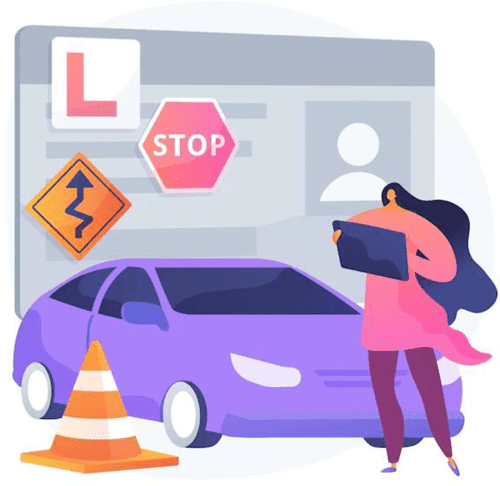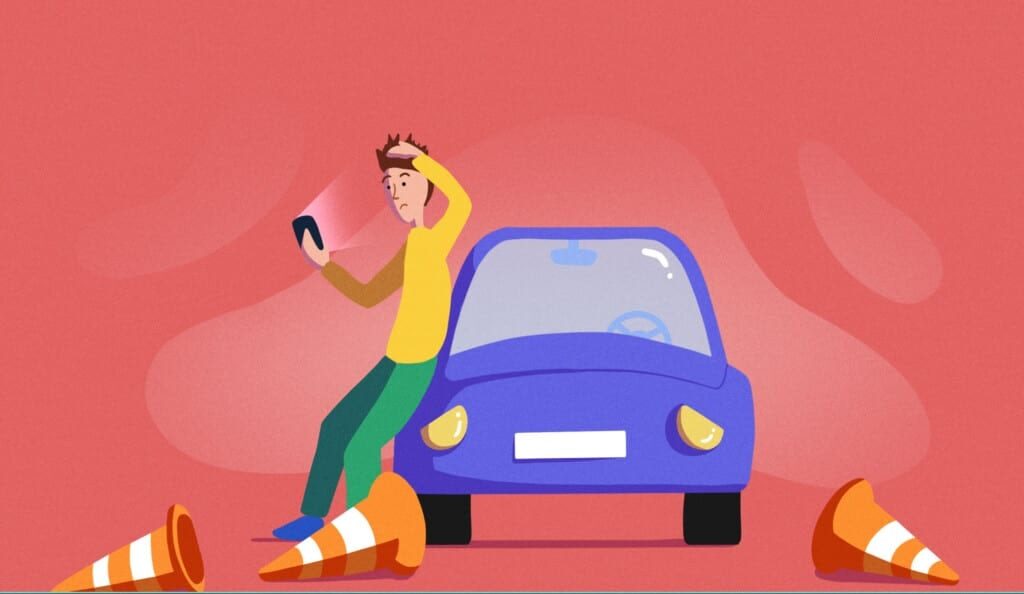Cheating in a Department of Motor Vehicles (DMV) examination results in immediate failure. State regulations describe cheating as the use of unauthorized materials, electronic devices, impersonation, or assistance during a test. DMV offices enforce strict penalties because test integrity is essential for road safety. This guide explains definitions, penalties, detection methods, retest policies, and legal consequences of cheating across multiple states.

Understanding DMV Examinations
DMV examinations serve as competency assessments for new drivers, learners, and commercial vehicle operators. Examinations fall into three categories:
-
Knowledge test: Covers traffic laws, signs, and safe driving practices.
-
Skills test: Evaluates practical driving abilities.
-
Commercial Driver License (CDL) test: Applies to professional drivers handling heavy vehicles.
Cheating primarily occurs in knowledge tests but also extends to CDL and specialized exams. DMV offices design exams to verify that applicants understand traffic laws and safety regulations.
Definition of Cheating Will Fail Dmv Rules
Clear policies define prohibited behavior to prevent manipulation of results.
Commonly Defined Cheating Acts
-
Using cell phones, smartwatches, or calculators.
-
Bringing notes, books, or electronic study guides into the test area.
-
Talking or signaling to another applicant during the exam.
-
Copying answers or receiving outside help.
-
Allowing another person to take the test in one’s place.
-
Offering money or gifts to DMV staff.
State-Specific Definitions
-
Illinois DMV: Lists open books, looking around, or phone use as suspicious conduct.
-
Oregon DMV: Defines cheating as behavior confirmed by both examiner and supervisor.
-
Massachusetts RMV: States that even attempting to cheat is a violation equal to actual cheating.
Immediate Consequences of Cheating
DMV offices act instantly when cheating is detected.
-
Automatic test failure: The applicant receives no score.
-
Termination of exam session: The test ends immediately.
-
Notations in DMV record: The incident is documented.
-
Exclusion from testing facility: Applicant is escorted out.
This immediate response protects test integrity and discourages future violations.
Retest Waiting Periods by State
Waiting times differ across jurisdictions. The following table shows major state penalties:
| State | Penalty for Cheating | Retest Waiting Period |
|---|---|---|
| Illinois | Test failure + record entry | 30 days |
| Washington D.C. | Test failure + suspension from retesting | 60 days |
| Massachusetts | Test failure + denial of permit/license | 60 days |
| Oregon | Test terminated + ban on new attempt | 90 days |
| Nebraska | Test failure recorded | Standard retest policy |
| California | Fraudulent Activity Hearing; license denial | ~1 year |
This variation shows that penalties are harsher in states like Oregon and California compared to Nebraska.
Extended Penalties Beyond Retest Delays
Fraudulent Activity Hearings in California
California DMV conducts hearings for fraudulent activity. Cheating, false identity use, or tampering triggers these hearings. If an applicant loses, the DMV may revoke, suspend, or deny driving privileges for up to one year.
Criminal Liability in Illinois
Illinois treats impersonation or bribery as criminal conduct. Laws mandate jail terms of at least seven days for impersonation cases. Attempting to bribe DMV staff results in denial of license and referral to law enforcement.
Cheating in CDL Examinations
Commercial Driver License tests involve stricter monitoring. CDL operators drive heavy trucks and buses; cheating undermines public safety. Investigative reports confirm that cheating schemes involve translators, electronic devices, or third-party test takers. Federal oversight adds additional enforcement in CDL contexts, with potential revocation of licenses and permanent record entries.
How DMV Detects Cheating
Observation and Confirmation
Examiners watch applicant behavior. Suspicious activity is escalated to a supervisor for confirmation, ensuring accurate documentation.
Surveillance Systems
Many DMV offices use cameras to monitor test rooms. Video evidence supports examiner reports in appeal cases.
Computer-Based Monitoring
Knowledge tests delivered via computer detect irregular answer patterns, such as rapid clicking or identical responses across candidates.
Restricted Test Areas
Oregon mandates that no companions or materials be present in the test area. Illinois rules state that books or phones in sight create suspicion.
Administrative Process After Detection
-
Examiner halts the test.
-
Supervisor reviews and confirms cheating.
-
Official report is added to DMV records.
-
Applicant receives notification of penalties.
-
Retest eligibility is delayed according to state rules.
-
In California, a hearing notice is issued.
This process ensures accountability and transparency in handling violations.
Appeal and Defense Procedures
Applicants accused of cheating may contest the charge.
-
Request written report: Obtain documentation of alleged conduct.
-
Review surveillance: Ask for camera footage when available.
-
File administrative appeal: Certain states allow internal review.
-
Seek legal assistance: In California, attorneys specialize in DMV hearings.
Defense strategies focus on disproving examiner interpretation or procedural errors.
Public Safety Justification
The rationale for strict anti-cheating policies is road safety. Drivers who bypass exams lack knowledge of traffic laws and driving standards. This lack of competency leads to accidents, injuries, and fatalities. CDL exam fraud poses greater risks due to vehicle size and cargo hazards. Enforcement ensures that only competent drivers operate vehicles legally.
Preventive Guidelines for Applicants
Study and Preparation Checklist
-
Read the official driver’s handbook for your state.
-
Use DMV-approved practice tests.
-
Schedule the exam only when fully prepared.
-
Bring only required identification documents.
-
Leave all devices and notes outside the testing room.
Compliance List for Test Day
-
Verify testing center rules in advance.
-
Arrive early to avoid rushing.
-
Place personal belongings in designated lockers.
-
Follow examiner instructions carefully.
-
Stay focused without interacting with other test takers.
Following these steps eliminates the risk of being accused of misconduct.
State Authority Sources for Verification
-
Illinois Secretary of State, Rules of the Road Handbook.
-
Washington D.C. Department of Motor Vehicles, Knowledge Test Rules.
-
Oregon DMV Administrative Rule 735-062-0040.
-
Nebraska Department of Motor Vehicles Testing Policy.
-
Massachusetts Registry of Motor Vehicles Driver Manual.
-
California DMV Fraudulent Activity Hearing Guidelines.
Applicants must review official documents in their respective states for the latest information.
Best Practices to Pass DMV Exams Without Cheating
-
Spend study time on road sign memorization.
-
Absorb safety regulations and penalty codes.
-
Clear confusion through online practice tools.
-
Follow structured study schedules.
-
Ensure readiness before scheduling the test.
These practices increase the chance of success without the need for dishonest behavior.
FAQs
Q1: What happens if you cheat on a DMV test in Illinois?
Illinois records the attempt as a failure and bans retesting for thirty days. Impersonation is criminal and carries a minimum jail term.
Q2: Can cheating on a DMV test affect future license eligibility?
Yes. Some states such as Massachusetts block license issuance for sixty days. California may deny license privileges for a full year.
Q3: Does a cheating record appear permanently in DMV files?
Yes. Reports are logged into DMV records. Repeat offenders face harsher scrutiny in future applications.
Q4: Is cheating on a CDL exam treated differently?
Yes. CDL fraud is more serious because it endangers public safety. Federal oversight adds stricter enforcement measures.
Q5: How does Oregon DMV detect cheating?
Oregon requires examiner observation and supervisor confirmation. Rules mandate empty test areas and prohibit companions.
Learn More: What Is a 14 Out of 20? Complete Guide With Context, Conversions, and Global Meaning
What Time Does Burger King Serve Lunch?
Conclusion
Cheating in DMV examinations leads to automatic failure and extended penalties. State policies differ, but every jurisdiction treats cheating as a violation of trust and safety. Retest bans range from thirty to ninety days, with California extending restrictions to a year through hearings. Illinois criminalizes impersonation with mandatory jail time. CDL fraud is subject to heightened enforcement due to public safety risks. Applicants should prepare ethically, follow rules, and respect testing integrity. Passing legitimately ensures knowledge, safety, and long-term driving privileges.

